February 13, 2019
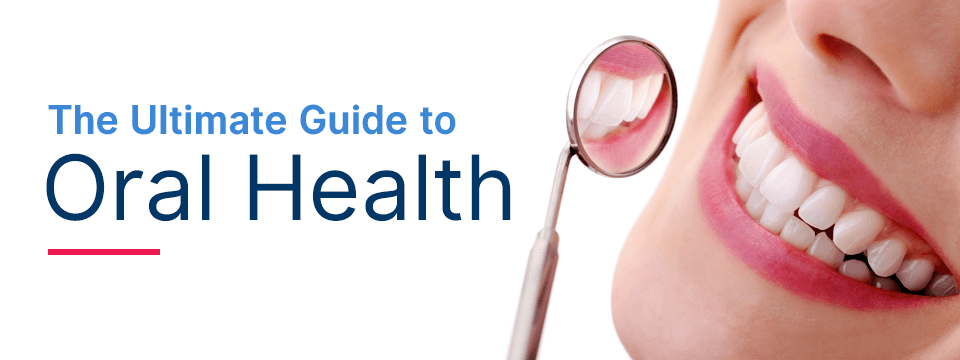
Whether you are 2 or 92, practicing good oral hygiene should be an essential part of your daily self-care routine. But, if you are like many adults in the United States today, you also realize that your oral health isn’t what it should be. A 2015 study revealed that 30 percent of adults rate the condition of their teeth and mouth as either “poor” or “fair.” In the same survey, 20 percent of those who responded said the condition of their teeth was a source of anxiety for them.
Everyone wants a beautiful, healthy smile, but the problem is that many people falsely believe that brushing their teeth is only important to maintain white teeth and good breath.
When it comes to having healthy teeth and gums, there’s more to it than just using a toothbrush. Yes, brushing and flossing regularly are both great ways to maintain your teeth and gums, but regular dental checkups, monitoring what you are eating and drinking, and even understanding the role genetics play in oral health are also valuable tools in your oral hygiene tool belt.
Besides having a healthy white smile, having good overall oral health is important because it has a direct and serious impact on your general health. Poor oral hygiene and the oral conditions that stem from it can lead to a variety of severe health conditions, including cardiovascular disease and endocarditis — an infection of the lining of the heart. Poor oral hygiene can create health problems in other areas of your body, and certain health conditions, such as diabetes and Alzheimer’s Disease, can negatively impact your oral hygiene, which means that neglecting your teeth can quickly become dangerous.
When we use the phrase “oral health,” we’re talking about much more than just your teeth. The term “oral health” encompasses your teeth, gums, mouth, jaw and face. Conditions that can impact the state of your oral health range from the all-familiar and dreaded gingivitis to more serious diseases such as throat or tongue cancer. Oral health has a direct impact on your ability to smile, talk, taste and express emotion. Oral health problems can result in other physical problems, as well as mental and emotional issues.
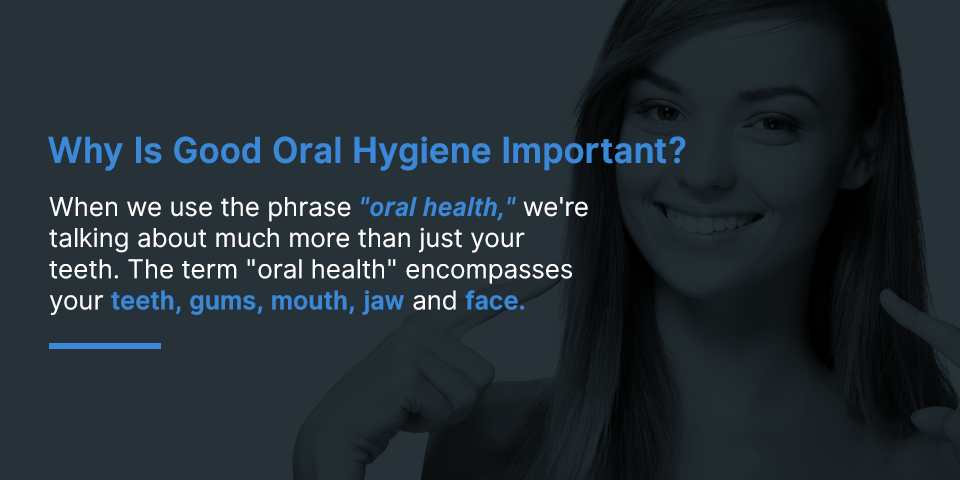
In recent years, scientists and medical professionals have developed a more thorough understanding of the link between an individual’s oral health and overall health. In other words, the condition of your mouth, teeth and gums, among other things, is a vital component of your overall health and well-being. Why? Your mouth contains bacteria. In small amounts, this is not a problem. When you brush and floss regularly, you keep the number of bacteria in your mouth down to a healthy level. But, when you neglect oral hygiene or develop a condition such as dry mouth, that impacts the number of bacteria in your mouth.
As the bacteria begins to build up, your body’s immune system is naturally activated to fight the bacteria. If left untreated over time, these natural defenses can cause decay in your gums and the structures that hold your teeth in place. What develops is a disease called “periodontitis,” more commonly known as “gum disease.”
Gum disease may start in your mouth, but its impact extends far beyond. Gum disease has been found to either increase the risk or complicate the treatment of:
The inflammation associated with gum disease makes it harder for the body to process insulin, making it harder for a person with diabetes to maintain healthy levels of blood sugar. High blood sugar is also associated with causing or worsening gum disease, meaning that oral hygiene and overall health are incredibly tangled for these individuals.
More than 90 percent of people with heart disease also have gum disease. The inflammation within the mouth has been found to cause inflammation in and around the heart, leading to an increased risk. Additionally, the inflammation in the blood vessels can increase an individual’s risk for a stroke or heart attack too.
Oral inflammation has been shown to increase a pregnant woman’s risk for premature birth. Being born early means that a child may struggle with the complications associated with premature birth and low birth weight. It may also impact the baby’s development in the uterus.
There are many other health conditions currently being investigated for their link to gum disease and poor oral health, including osteoporosis, obesity, rheumatoid arthritis and certain lung conditions. Early studies have shown possible connections between these conditions and oral health, but more research is needed to understand them fully. In the meantime, it is clear that the condition of your mouth plays a huge role in the condition of your overall health. Just like you might change your diet and lifestyle to improve your heart health or lose weight, there are things you can do to improve your oral health and protect yourself from other health conditions.
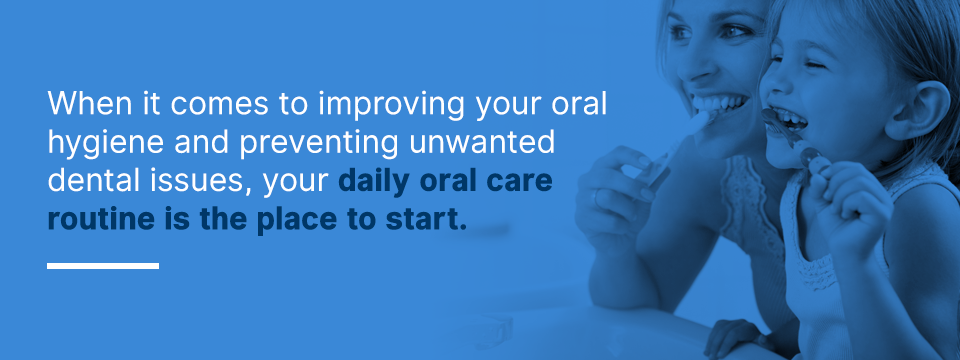
When it comes to improving your oral hygiene and preventing unwanted dental issues, your daily oral care routine is the place to start. Your dentist can offer recommendations on how to personalize your care, based on your health history and age, however, there are some general practices anyone should follow.
Brushing after meals clears your mouth of plaque, which can cause gum disease and decay. If you can’t brush after every single meal, aim to brush twice a day — in the morning and then again at bedtime. When you brush, brush gently in a circular motion, not in a rapid back-and-forth motion, to avoid being too harsh on your gums.
Flossing at least once a day can help reach the plaque lodged in between your teeth. Using an antibacterial mouthwash can also help to remove plaque from hard-to-reach areas.
We’ll get into the impact of food on your oral hygiene later on, but, for now, know that maintaining a diet low in sugar and avoiding foods like potato chips, soft drinks, candy, dried fruit, cakes, cookies and ice cream is a good place to start. When you do indulge in these foods, try to brush your teeth after you finish or, if you don’t have a toothbrush handy, chew on a piece of sugarless gum.
When the status of your oral health changes, you will be the first one to notice it. By examining your teeth, gums, tongue and the inside of your mouth, you will quickly be able to spot changes such as chipped teeth or sores that may need to be addressed by your dentist.
Your dentist is an excellent resource for helping you develop a plan for your oral care, especially if you have health conditions that may impact your oral health, such as pregnancy, heart disease or diabetes. While these guidelines are a great starting point, they are not meant to be a substitute for regular visits to your dentist.
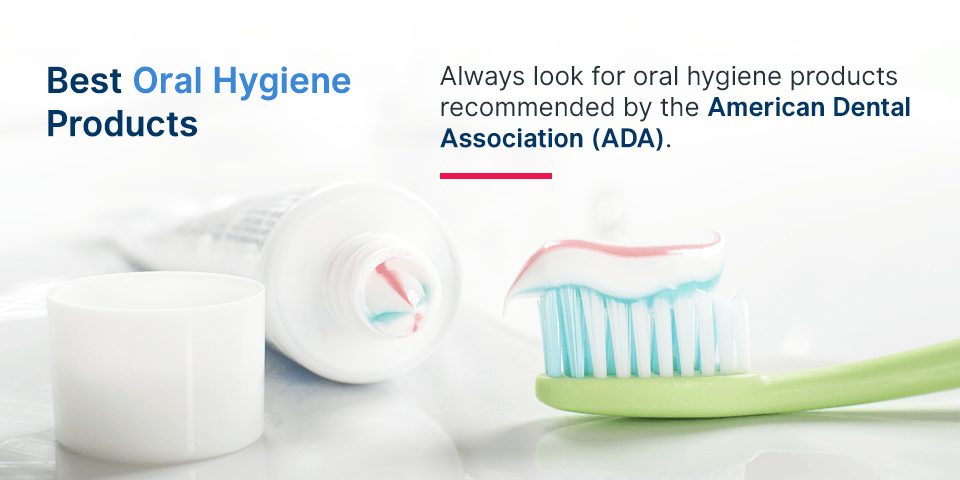
Television is filled with commercials for toothpaste, mouthwashes and other products promising stronger teeth and gums, whiter teeth and a better smile. So how do you wade through the marketing to determine what products will benefit you?
In general, you should always look for oral hygiene products recommended by the American Dental Association (ADA). The ADA verifies a product’s claims before its seal can be added to a product, so you can rest easy knowing that a product with their Seal of Acceptance isn’t making false claims on its packaging.
Besides the ADA seal, there are a few key things to look for when you’re making a purchase:
Fluoride helps to prevent tooth decay and protect the enamel on your teeth. There are a lot of other kinds of toothpaste out there claiming to help whiten teeth, fight gingivitis, freshen bad breath and more. While these promises sound great, certain additives have been found to break down the enamel on your teeth. It’s always a good idea to check with your dentist before trying out a new toothpaste to make sure that its additives don’t conflict with any oral health issues you may have.
Toothbrushes come in three different levels of bristles —soft, medium and hard. Medium and hard tend to be too abrasive and can hurt your gums, especially if you don’t have proper brushing technique. An alternative to a traditional soft-bristled brush is an electric toothbrush, which can help individuals avoid brushing too harshly and hurting their gums.
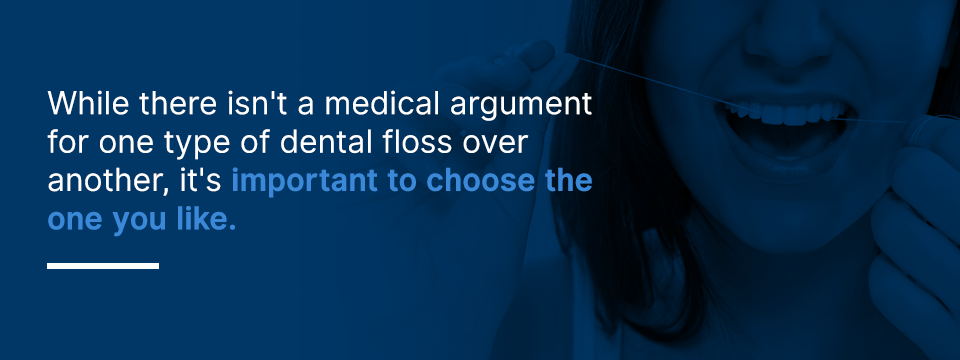
If you hate using dental floss, you’ll be less likely to use it. While there isn’t a medical argument for one type of dental floss over another, it’s important to choose the one you like. If your teeth are squished tightly together, a waxed floss may make it easier to slide the floss in between each tooth. There are also a variety of flavored flosses out there that can make flossing easier to tolerate.
Everyone wants a bright white smile, but certain whitening products can be messy or cause side effects like tooth sensitivity. If you can, get a whitening treatment at your dentist’s office. It’s more effective and the dentist can use high-quality products on your teeth. If you opt for home whitening, you will likely still get some results, but they may not be as significant as the ones you’d get at the dentist.
If you have trouble getting your teeth clean with regular brushing and flossing, consider trying one of these add-ons. Oral picks and sticks can help to reach food particles around the gums and in between teeth. Oral irrigators, which use water instead of brush bristles or string to reach trapped plaque and food particles, are especially helpful for children with braces or adults with fixed partial dentures because the pressurized water stream can infiltrate hard-to-reach spots.
A good antibacterial mouthwash can also supplement regular flossing and brushing, but make sure you know which one is right for you. Some are geared toward masking bad breath, others are designed to reduce plaque. Consult with your dentist to determine which will best meet your personal needs.
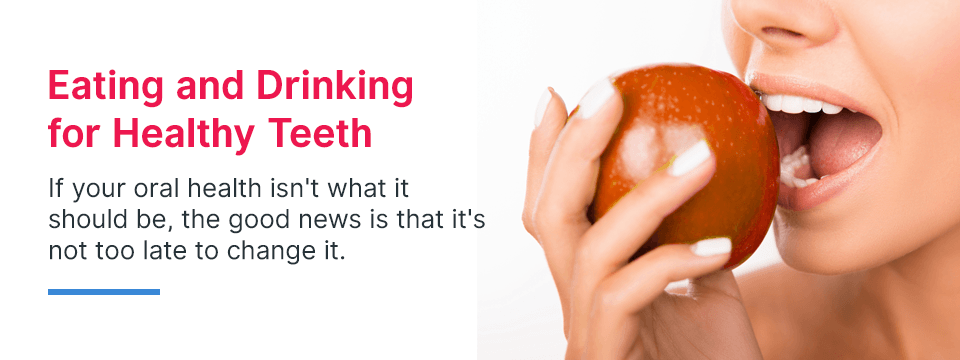
If your oral health isn’t what it should be, the good news is that it’s not too late to change it. You have a lot of control over the condition of your mouth, and with a few simple lifestyle changes, you can drastically improve the health of your teeth, gums and everything around them. Obviously, the first and most important change you can make is to be diligent in brushing and flossing. Increase the frequency with which you do these things, invest in a good toothbrush and paste, and consult with your dentist about the possibility of supplementing with mouthwash or other products such as an oral irrigator.
Besides those things, there are a few steps you can take to contribute to improved oral — and overall — health.
That’s right. Consuming a healthy combination of fruits and vegetables, lean meats, fish and whole grains is a great start. Avoid foods that are high in sugar and low in nutritional value.
Foods like meat, nuts, cheese and milk provide phosphorus and calcium needed to protect the enamel on your teeth. If you are allergic to dairy or lactose intolerant, opt for an extra helping of spinach or broccoli — these green vegetables are also high in calcium.
You may not be able to stop snacking completely, but limiting the number of snacks you eat — and what kind of foods you snack on — can keep your mouth healthy. The reason snacking can be detrimental is that people typically do not brush after a snack, meaning food particles are left sitting in the mouth for a while. Over time, this can contribute to plaque and decay. If you need to grab a mid-afternoon pick-me-up, opt for crunchy fruits, vegetables or a handful of nuts. Avoid snacking on citrus fruits, bananas, dried fruits or anything high in sugar, such as cakes, cookies, candy or bread products.
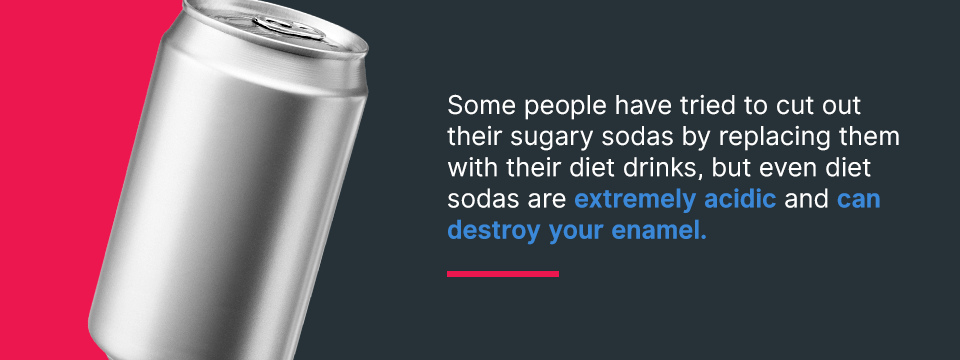
Soft drinks are high in sugar and, if you’re like most people, you sip on them over time. That kind of exposure to sugar sets your mouth up for trouble, and sipping a sugar-filled beverage throughout the day means sugar is constantly in your mouth. Some people have tried to cut out their sugary sodas by replacing them with their diet drinks, but even diet sodas are extremely acidic and can destroy your enamel.
No, a morning cup of joe isn’t going to wreck your oral health, but if you like to load up your latte with sugary creamers or syrups, you may be setting yourself up for trouble. You should limit the amount of sugar you put into your favorite morning beverage and make sure you don’t spend hours sipping on it. Just like soda, sipping on a sugar-laced beverage throughout the day is only going to increase your mouth’s exposure to unwanted sugars.
So, if you limit sodas, juices and coffee, what’s left? Water, of course. While most water has some fluoride in it, if your home is attached to a public water supply, your supplier has likely added fluoride in the appropriately recommended levels. Adding fluoride to public water has been shown to decrease tooth decay in adults and children by 25 percent. If your home gets its water from a well system, talk with your dentist to determine whether your family may benefit from taking daily fluoride supplements.
By taking these first steps toward a healthier mouth, you are also taking the first steps toward a healthier you. Whatever your age and whatever the condition of your mouth, it’s never too late to improve your oral hygiene.
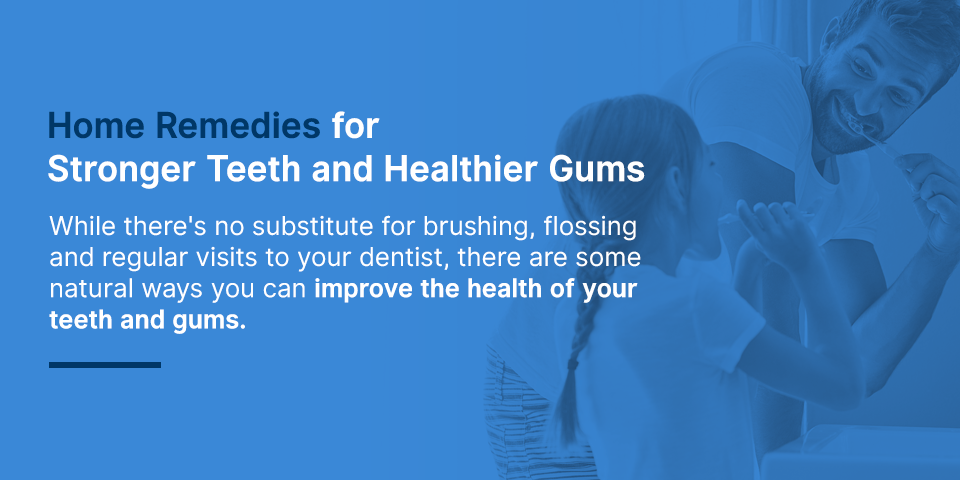
While there’s no substitute for brushing, flossing and regular visits to your dentist, there are some natural ways you can improve the health of your teeth and gums. But, as always, before you make a significant switch in your oral health, it’s important to consult with your dentist, particularly if you have an ongoing oral health condition or an overall health condition that may be impacted by your use of a new substance.
Studies have shown that individuals who do not have enough Vitamin D in their bodies are a higher risk for gum disease. This is likely because Vitamin D helps the body to kill bacteria. While Vitamin D is available in supplement form, foods such as tuna, eggs, salmon and fortified orange juice are also high in this valuable nutrient.
Baking soda has long had a reputation as a great way to whiten your teeth. Some toothpaste even contains baking soda as a whitening agent. If you’re looking to use baking soda as a home alternative to whitening products, mix equal parts baking soda and water and then apply it to your teeth. However, you should be aware that baking soda can only reach the surface stains on your teeth, so older, deeper stains won’t disappear. Also, baking soda can eat away at the enamel on your teeth, so using this treatment frequently over a long time may damage your teeth.
Green tea has huge benefits for dental health. Green tea has been found to prevent starchy foods — such as cakes and bread — from causing decay. Studies have also shown that people who regularly drink green tea have healthier gums. So go ahead and pour another cup — just don’t add lots of sugar to it.
Essential oils have become trendy for their contributions to overall health and well-being, but did you know that certain oils can benefit your oral hygiene too? Oils like tea tree, eucalyptol and menthol are known to help prevent the growth of bacteria in the mouth. Check your drugstore aisles for toothpaste containing these ingredients. Or, depending on what kinds of oral health issues you may be experiencing, consider trying a homemade mouthwash. For example, lemongrass oil has been found to reduce plaque and gingivitis. Dilute two or three drops of lemongrass oil into a cup of water and rinse around your mouth for 30 seconds before spitting it out. Repeat this two or three times a day.
While essential oils can be a great asset to any oral health regimen, they should never be considered as a substitute for regular brushing and flossing. It is also important to remember that, even though they are natural products, you should not swallow any products that contain these oils. If you use a toothpaste containing an essential oil or make your own mouthwash, always spit it out when you are done.
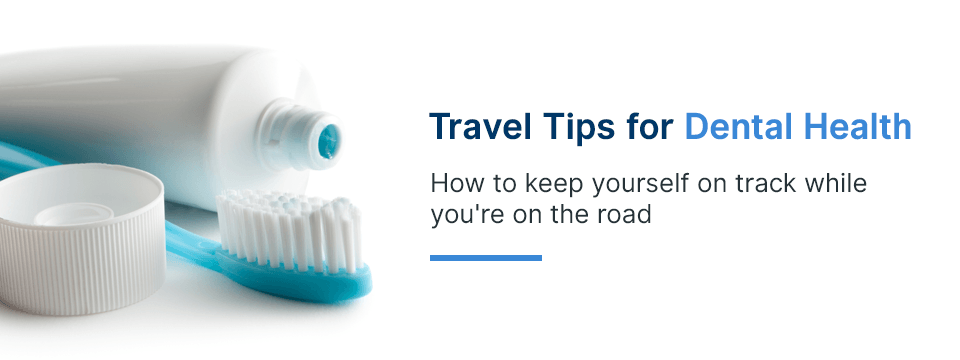
When you’re traveling, it can be tempting to ease up on your oral hygiene and skip steps in your daily routine. But times of traveling can often be some of the most important when it comes to maintaining a healthy mouth. When you’re on the road, you’re less likely to eat and drink as you would at home. You may be more likely to grab a sugary beverage during a pit stop or mindlessly munch on potato chips while you’re stuck in traffic. To keep yourself on track while you’re on the road, keep these three tips in mind:
Keep a travel toothbrush in your purse or an easily accessible travel bag. When you stop for a meal or to use the bathroom, take an extra minute or two to brush thoroughly.
If you can, pack your own snacks and water bottles to help your diet stay on track while you travel. Avoid sugary snacks and drinks by packing healthy meals and snacks similar to what you’d eat if you were at home. If you have to stop for food or drinks along the way, make wise choices by avoiding sugary soft drinks, juices and candy — anything high in sugar that will sit on your teeth.
Once you’ve arrived at your destination, take the time to brush, as well as floss, your teeth. By doing a thorough cleaning, you’ll get your oral hygiene routine back on track and get rid of anything that might have built up during your travel.
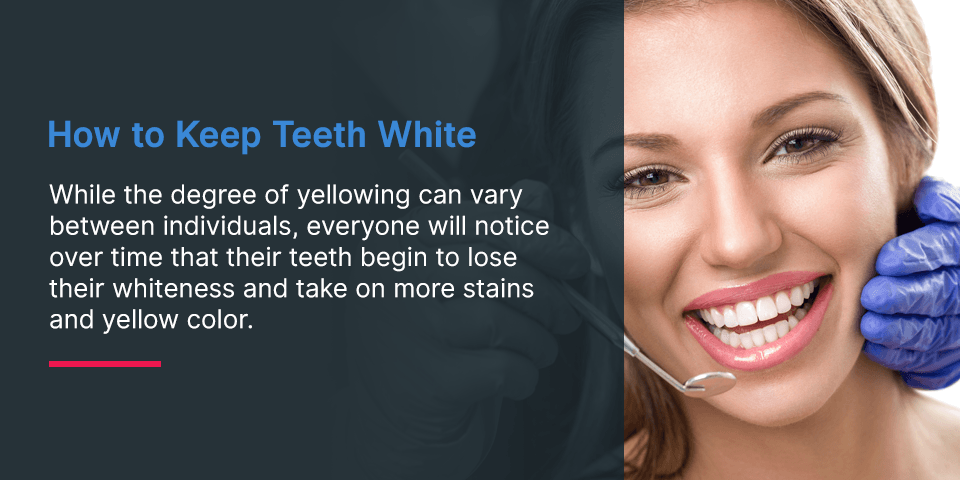
Keeping teeth white over time can be a challenge. While the degree of yellowing can vary between individuals, everyone will notice over time that their teeth begin to lose their whiteness and take on more stains and yellow color. This can be caused by a variety of factors, including smoking, diet, illness and poor oral hygiene. There are certainly a lot of options out there for whitening products — both in your drugstore and in your dentist’s office — but the best way to maintain white teeth is to avoid the things that contribute to yellowing.
Smoking is a big cause of yellowing. Stains caused by smoking are hard to get out, especially if you don’t quit smoking. However, if an individual quits smoking and follows a good oral hygiene routine, they may begin to see some improvement, especially when coupled with the use of a whitening product.
What you drink can alter the color of your teeth. Beverages such as coffee, red wine and tea are three of the biggest culprits when it comes to yellow teeth. Ideally, the best way to avoid stains from these beverages would be not to drink them. If you can, drink your coffee through a straw to send the liquid past your front teeth. Or brush after you finish your coffee.
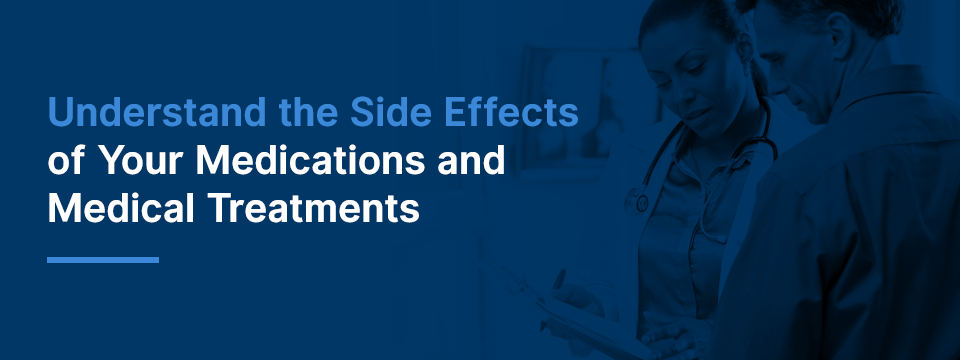
Some medical treatments — such as chemotherapy for cancers located in the neck or head — have been known to cause yellowing of teeth, as have certain prescription medications., particularly ones used to treat high blood pressure and asthma. While you may not be able to avoid these treatments or medications, talk to your dentist about ways you can protect your teeth or minimize the yellowing.
One cause of yellow teeth may be unavoidable — aging. Over time, your teeth will be exposed to many foods, drinks and substances that may alter their natural white appearance. While you can’t prevent your mouth from aging, you can do everything you can to protect it by following a strict oral hygiene regimen. Continue to brush and floss regularly, avoid sugary foods and drinks, and visit your dentist regularly. You may not be able to completely prevent yellowing, but you may be able to minimize the effects of age on your teeth.
If you find that you are following these steps but your teeth continue to yellow, talk with your dentist about whitening treatments or products that might benefit you and slow — or even reverse — the yellowing process.
When you meet a friend for drinks after work, you probably don’t think about what that drink might do to your teeth. And, if you’re only enjoying an occasional drink after work or on the weekend, it probably isn’t having a significant impact on your mouth. But, if you are a regular — or heavy — drinker, your consumption of alcohol may be doing more damage than you realize. In fact, one of the most common risk factors for oral cancer is alcohol abuse.
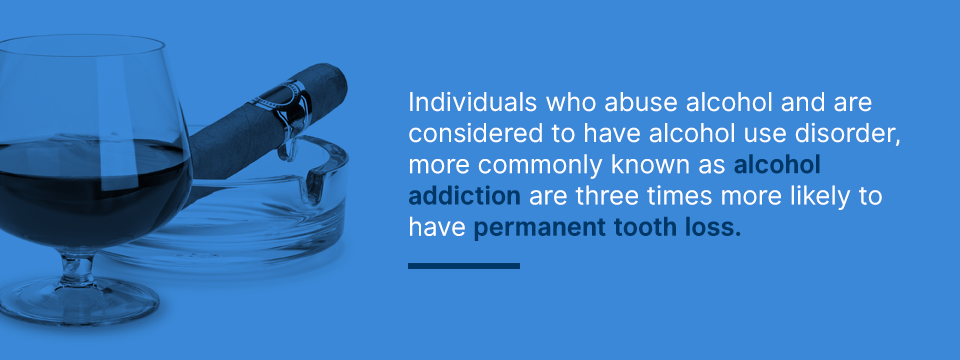
Individuals who abuse alcohol and are considered to have alcohol use disorder — more commonly known as alcohol addiction — are three times more likely to have permanent tooth loss. They also have significantly higher levels of plaque than their non-addicted counterparts.
But what about light or moderate alcohol consumption?
This one is more complicated. There isn’t much research to point to the negative effects that light to moderate alcohol consumption has on oral hygiene, but dentists still believe it has a big impact. How?
When your mouth is dry, it isn’t making enough saliva to wash away unwanted plaque and bacteria. Drinking water along with your adult beverage can help prevent this problem.
If you’re consuming wine or beer — which are both highly acidic — or mixing liquor with dark sodas, you may also be more susceptible to staining. Sipping your drink with a straw and washing your mouth out after you finish a drink can slow down the staining process.
It’s best to avoid chewing on the ice that often comes in a cocktail or mixed drink. Also opt to avoid ordering a drink “with a twist,” since the acid found in citrus products like lemons and limes can erode tooth enamel.
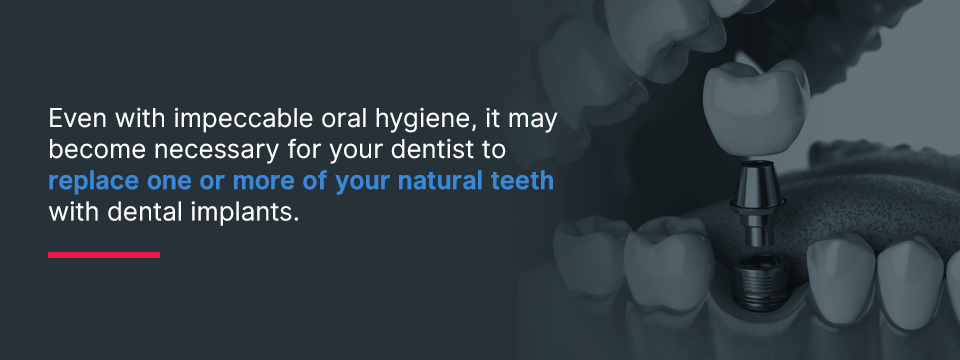
Even with impeccable oral hygiene, it may become necessary for your dentist to replace one or more of your natural teeth with dental implants. A dental implant is a titanium post designed to mimic the root of a tooth. It is surgically inserted into the jawbone at the gumline and then topped with an artificial tooth designed to fit in with the remaining natural teeth.
Dental implants have become a good alternative to bridges and dentures because they can be inserted without impacting other teeth around the empty space they are filling. They are also good options for adults who have had trouble with dentures, such as gagging, poor ridges or sore areas. Even though they were developed as a more comfortable alternative to traditional bridges and dentures, dental implants are not just for older adults. They are being used on teens and adults of all ages — anyone who needs one or more of their teeth replaced due to accidents, aging or illness.
The American Dental Association has approved two primary types of dental implants:
These implants are comprised of a metal frame that is fixed into the jawbone below the individual’s gum tissue. As the healing process happens, the metal frame becomes fixed into the jawbone and gums. Posts are attached to the frame, then an artificial tooth is placed over the posts, filling in the empty spot and appearing as natural as any of your own teeth.
These implants are surgically placed into the jawbone and become permanently attached to the jawbone as it heals. After they have healed, a second surgery is then performed to connect posts to the implant. These posts are then topped with the artificial tooth or connected to a bridge or dentures.
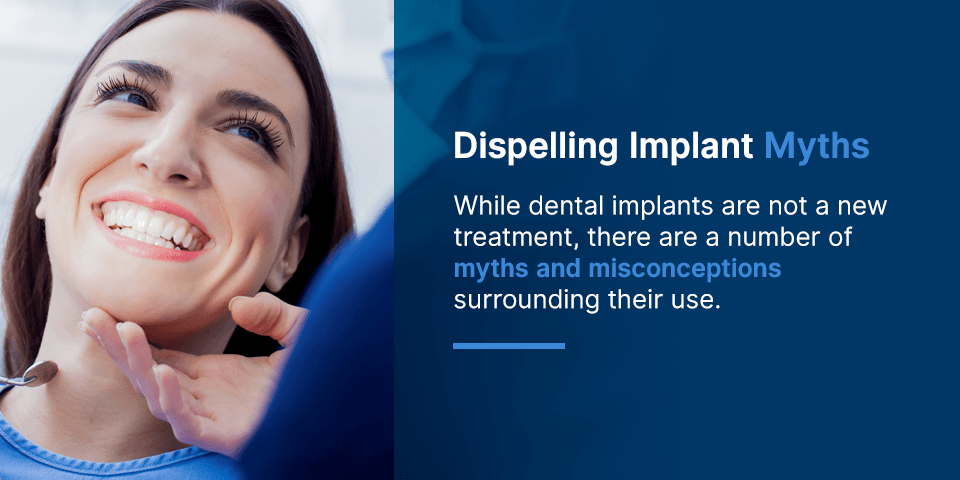
Dental implants can be a great alternative to bridges or dentures, but often times, people are hesitant to select this option. While dental implants are not a new treatment, there are a number of myths and misconceptions surrounding their use.
Fact: Once a dental implant is in place, you take care of it the same way you would your natural teeth — brushing and flossing regularly are the best way to maintain them.
Fact: While it’s true that you may be required to pay more up front, if you look at the cost over time, dental implants will actually save you money. If you take care of them and maintain good oral hygiene, dental implants are designed to last a lifetime. Dentures and bridges don’t last nearly this long, meaning you can plan to spend money replacing them periodically. Over time this adds up to more than the cost of dental implants.
Fact: The time it takes to recover from dental implant surgery varies depending on the type of implant being used and how quickly a person may heal. While it is not possible to completely predict an individual’s recovery time, it’s a good idea to talk with your dentist about your oral health and their expectations for the healing process.
Fact: It is important to select a dentist who is specifically licensed and trained to insert a dental implant. Additionally, you should always ask around to find out what their reputation is. When it comes to the health of your mouth, you can never be too picky.
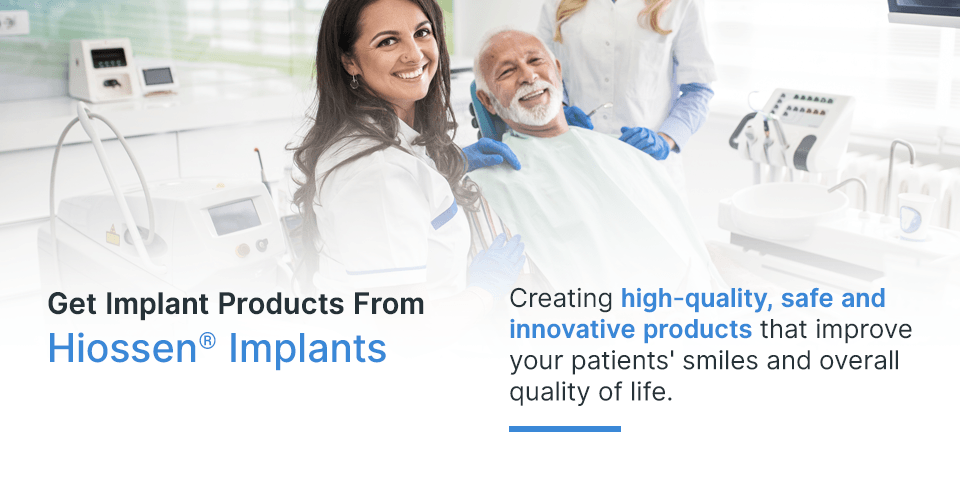
Being a good dentist means caring about your patients’ oral and overall health and wellbeing. Understanding the role that good oral hygiene plays in your patients’ everyday life is critical to providing high-quality care for adults and children alike. If you are a dental provider who is licensed to perform dental implant procedures, you are also tasked with providing safe and effective implants for your patients.
Hiossen® Implants is one of the top five producers of dental implants in the world. Our goal is to create high-quality, safe and innovative products that improve your patients’ smiles and overall quality of life. For more information about our products, contact us today.